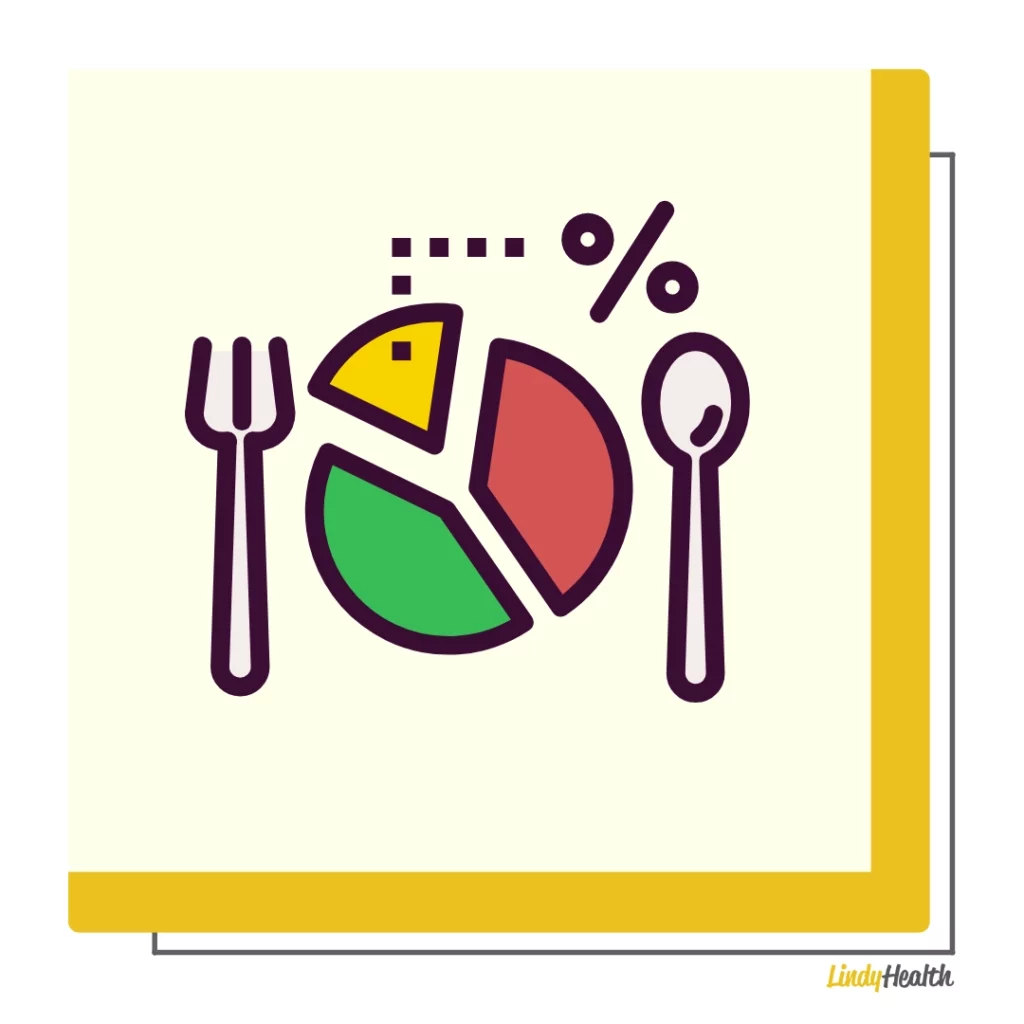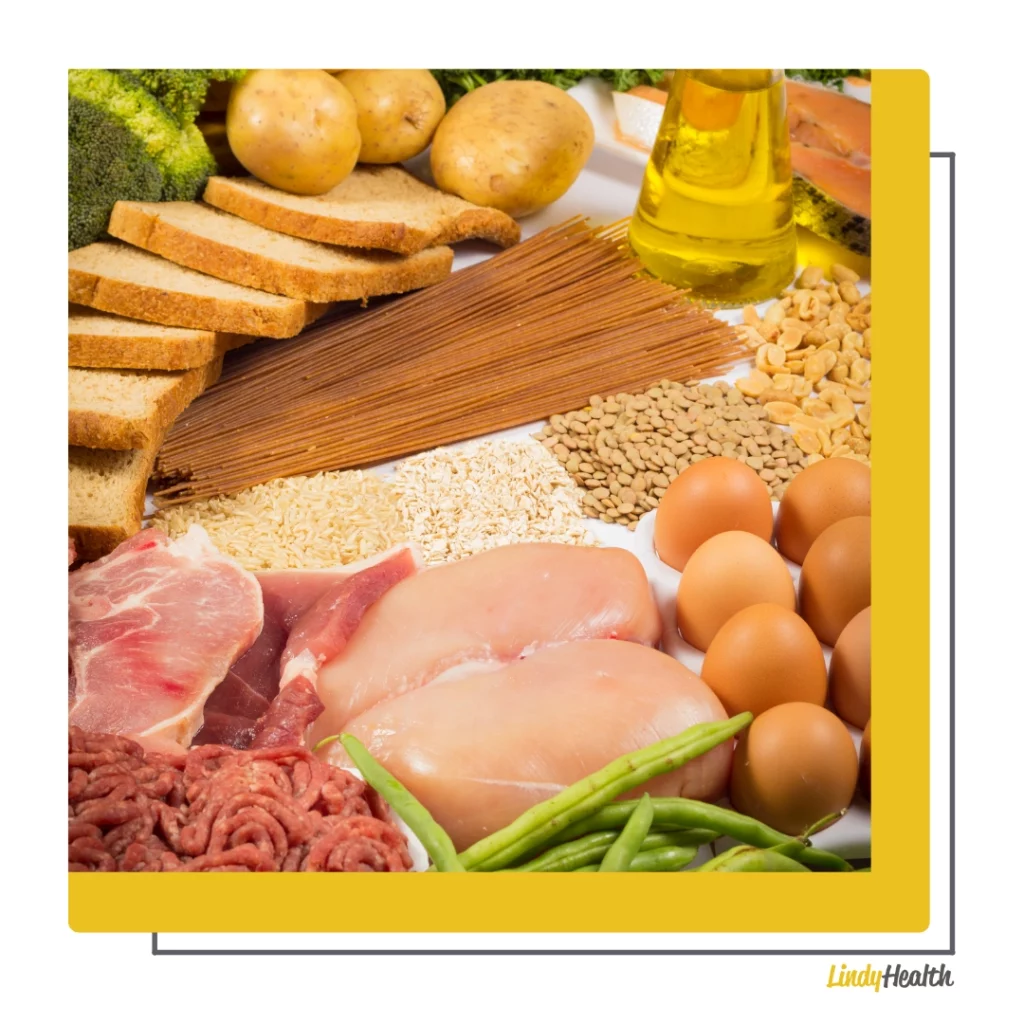Lindy Health teaches you everything you need to know about macros while breastfeeding.
We will dive into how to calculate your macros, the best foods to eat for macros, and how to adjust your macros as you breastfeed.

There are a few common challenges that people have when it comes to macros while breastfeeding including:
The first challenge is that many people don’t know how to calculate their macros. This can be tricky, especially if you’re unsure what your calorie intake should be.
Another challenge is that people often don’t know where to find good sources of macronutrients. This cannot be easy, especially if you are on a budget.
Finally, some find it challenging to stick to their macros while breastfeeding. This can be difficult, especially if you are new to counting macros. If you incorporate some planning and preparation, you can ensure that you get the proper nutrients for yourself and your baby.
What are Macros
The three primary nutrients the body needs are macronutrients, including protein, carbs, and fat, these are macronutrients. These nutrients are vital for breastfeeding mothers, but protein is especially important. Protein is essential for producing quality milk and helps keep you feeling full and energized.

That’s why it’s essential to ensure you’re getting enough protein while breastfeeding. The good news is that it’s easy to calculate your macros and ensure that you get the right amount of protein daily. All you need to do is track your food intake and find out how many grams of protein are in the foods you eat.
Once you know how much protein you need, you can start planning your meals around high-protein foods like chicken, fish, beef, eggs, legumes, and dairy products.
The contents of what you are eating and a specific meal plan are not as important as making sure you are hitting your macros daily. Your body needs these macronutrients to grow, develop, and function to their fullest.
These foods will help you meet your daily protein needs while providing other important nutrients like carbs and healthy fats.
How to Calculate Your Macros while Breastfeeding
Calculating your macros is easy once you know how much protein you need.
Protein: You want to keep your protein around 1 – 1.5 grams of protein per pound of body weight every day.
Carbs: While pregnant you are providing both you and your baby with nutrients. You may want to up your carbs to double your body weight in grams per day.
Fat: Fat is essential for brain development and functioning in both you and your child. You will want to keep your fat intake between 70 – 120 grams per day.

You may also want to break this down so you know what your macro intake should be per meal.
First, find out how many grams of protein are in your foods. Then, divide that number by the number of meals you eat daily. That will give you the number of grams of protein you need to eat at each meal.
For example, if you eat four meals daily and each meal has 30 grams of protein, you would need 120 per day. You can then divide that number by 4 to determine how many grams of protein you need to eat at each meal. So, in this example, you would need 30 grams of protein at each meal.
This however would be a lot of meals. If you know anything about bodybuilders or athletes you know they usually have a protein drink nearby.
While this will be different and you should always speak with a registered dietician or your doctor this is a solid baseline for anyone looking to optimize their macros while breastfeeding.
Foods to Eat for Macros When Breastfeeding
Many foods are good for macros when breastfeeding, but some stand out above the rest. The best foods to eat for macros are those high in protein, carbs, and healthy fats. Foods like chicken, fish, beef, eggs, legumes and dairy products are all great options for meeting your daily protein needs.

Carbs provide energy and nutrients to you and your baby, so you must include plenty of healthy carbs in your diet. Good sources of healthy carbs include fruits, vegetables, whole grains, and legumes.
Finally, healthy fats are essential for maintaining energy and keeping your baby healthy. Good sources of healthy fats include nuts, seeds, olive oil, avocado, and coconut oil.
Sample Meal Plans That Include Macros
There are many different ways to create a meal plan that includes macros, but here is one example of a day’s worth of meals.
Breakfast: Scrambled eggs with toast and fruit
Lunch: Turkey sandwich with cheese, lettuce, and tomato on whole wheat bread
Snack: String cheese and an apple
Dinner: Grilled chicken with roasted vegetables
This is just one example of a meal plan that includes macros. You can customize it to fit your own needs and preferences.
Tips for Sticking to your Macros while Breastfeeding
Sticking to your macros while breastfeeding can be a challenge, but it can be done with a bit of planning and preparation. Here are a few tips for making sure you stay on track:
- Make a meal plan and stick to it. This will help you ensure you get the proper nutrients at each meal.
- Include plenty of healthy carbs in your diet. Carbs provide energy and nutrients to both you and your baby.
- Eat plenty of protein. Protein is essential for breastfeeding mothers because it helps produce quality milk.
- Drink plenty of water. Water is crucial for you and your baby and can help keep you hydrated during breastfeeding.
- Get enough sleep. Getting enough sleep is essential for overall health and is imperative when breastfeeding.
- Take breaks during breastfeeding sessions. This will help keep you from getting too tired while breastfeeding.
- Avoid processed foods. Processed foods are often high in unhealthy fats and calories, making it challenging to stick to your macros.
- Exercise regularly. Exercise can help you maintain a healthy weight and is also suitable for your overall health.
Following these tips will help you stick to your macros while breastfeeding and ensure that you and your baby get the nutrients you need.
Losing Weight While Breastfeeding
Losing weight while nursing can be challenging, but it’s not impossible. If you’re looking to lose weight, tracking your macros can be a great way to do it. By keeping track of the protein, carbs, and healthy fats you eat daily, you can create a meal plan that helps you lose weight safely and effectively.

How much weight you lose will depend on many factors, including how many calories you consume and burn. But generally speaking, most women can expect to lose about 1-2 pounds per week by tracking their macros.
There are many excellent apps out there for tracking Macros. At Lindy Health we have seen truly inspiring success with the Lose It app.
That said, it’s important to remember that every woman is different. So if you’re not losing weight as quickly as you’d like, or if you’re experiencing any other health problems, talk to your doctor about changing your diet. They can help you adjust your macros to meet your specific needs.
What Should My Calorie Intake Be While Nursing?
Nursing mothers need to consume enough calories to support their own Health and the Health of their babies.
Several studies have suggested:
Caloric intake should increase by approximately 300 kcal/day during pregnancy.
– Michelle A. Kominiarek, Northwestern University Feinberg School of Medicine
However, there is no one-size-fits-all answer to this question. Every woman’s calorie needs will vary depending on their body composition, activity level, and dietary preferences.
Most nursing mothers need to eat around 2,000-2,500 calories per day.
It’s essential to listen to your body, eat when you feel hungry, and ensure you’re getting enough protein, carbs, and healthy fats. By eating a balanced diet and staying within your recommended calorie range, you can ensure that both you and your baby get the nutrients they need.
Talk to your doctor if you’re struggling to meet your calorie needs. They can help you create a meal plan that includes all the nutrients you need to support your Health and the Health of your baby.
What Should My Macros Be While Breastfeeding?
While every woman’s dietary needs vary, there are some general guidelines you can follow to ensure you’re getting the nutrients you need while nursing.
Most women should aim for around:
- 60 – 100 grams of protein daily
- 100 – 200 grams of carbs
- 50 – 100 grams of healthy fats
Recommended protein intake during pregnancy is 60g/day, which represents an increase from 46g/d in non-pregnant states. In other words, this increase reflects a change to 1.1g of protein/kg/day during pregnancy from 0.8g of protein/kg/day for non-pregnant states.
Carbohydrates should comprise 45-64% of daily calories and this includes approximately 6-9 servings of whole grain daily.
Total fat intake should comprise 20-35% of daily calories, similar to non-pregnant women.
– Priya Rajan, Northwestern University Feinberg School of Medicine
This will help provide the energy and nutrients you need to produce quality milk for your baby.
If you’re unsure how to calculate your macros, talk to your doctor or a registered dietitian. They can help you create a meal plan that meets your specific needs.
Conclusion
Losing weight while breastfeeding can be challenging, but it’s not impossible.
If you’re looking to lose weight, tracking your macros can be a great way to do it. By keeping track of the protein, carbs, and healthy fats you eat each day, you can create a meal plan that helps you lose weight safely and effectively.
How much weight you lose will depend on many factors, including how many calories you consume and burn. Generally speaking, most women can expect to lose about 1-2 pounds per week by tracking their macros.
That said, it’s important to remember that every woman is different. So if you’re not losing weight as quickly as you’d like, or if you’re experiencing any other health problems, talk to your doctor about changing your diet. They can help you adjust your macros to meet your specific needs.”
Do you have any tricks for tracking your macros while breastfeeding?
Let us know in the comments below!
- 5 Best Peptide Companies - February 27, 2024
- Best Beginner SARM Stack - February 15, 2023
- Male Hormone Panel Labs Explained - October 31, 2022








